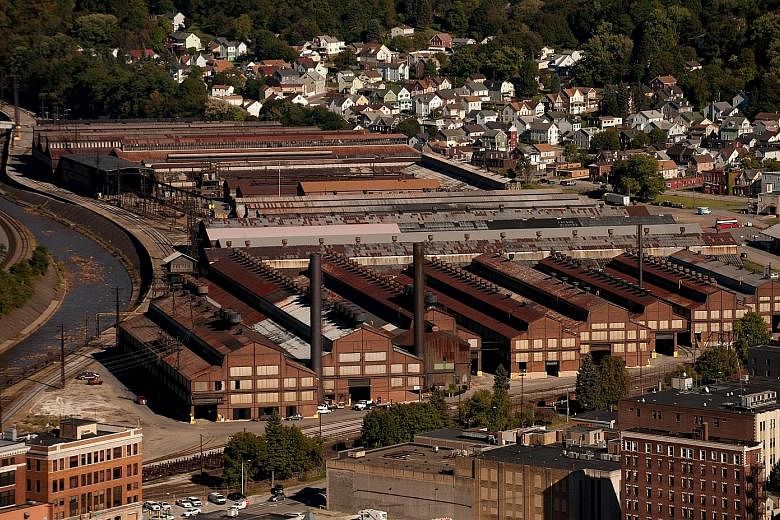Domestic
REPEALING OBAMACARE
The Affordable Care Act has resulted in an estimated 20 million people gaining health insurance coverage between 2010, when it was passed, and early 2016 - what the US Department of Health and Human Services calls a "historic reduction in the uninsured".
But the world's wealthiest and most powerful country continues to struggle to fix its healthcare system, with studies showing that medical expenses are among the leading causes of bankruptcies in the US. Up to 29 million Americans remain uninsured.
Obamacare has been opposed by Republicans as too complex, too expensive and giving citizens no alternatives. House Speaker Paul Ryan has promised an "orderly transition to replace" it, but many Republicans want it repealed immediately.
This is a political hot potato for President-elect Donald Trump, as repealing Obamacare without an adequate replacement will unleash anxiety and dissatisfaction which would tarnish his credibility with his support base.
CREATING JOBS
Mr Trump, who was powered to victory largely by disgruntled white working-class voters in post-industrial "rust belt'' states who felt left behind by globalisation, has repeatedly promised "jobs, jobs, jobs''.
To do this, he plans to slap tariffs on imports, especially from China and Mexico, tax American firms offshoring their manufacturing and shipping products back to sell in the US, slash corporate taxes and red tape, unleash a trillion- dollar infrastructure investment programme as well as curb illegal immigration.
Infrastructure spending will spur job creation in the short term, but whether the other measures will have the desired effect is a gamble.
Tax and tariff measures will narrow the competitiveness gap between the US and other countries, but not erase it. New investments in manufacturing will likely not create as many jobs as Mr Trump hopes, since sectors from cars to steel now use automation. A trade war with China will drive up retail prices, hurting the very people who voted for the billionaire businessman, and hurting many other areas of profitable collaboration.
Foreign
ISLAMIC STATE IN IRAQ AND SYRIA
Mr Trump wants to take a harder line on ISIS. He has put generals in key national security posts, blamed President Barack Obama for not being tough enough and pledged, during his rallies, to "bomb the s*** out of " ISIS.
He has also promised "extreme vetting'' for immigrants from countries deemed to be hotbeds of radical Islam and to revive the National Security Entry-Exit Registration System enacted after the Sept 11, 2001 terror attacks. But Mr Obama on Dec 22 scrapped the scheme which targeted Arabs and Muslims and was a bone of contention between rights groups and the federal government.
Given Mr Trump's mercurial ways, analysts worry about an overreaction to a terrorist event. They also worry that blanket targeting of Muslims will drive up Islamophobia and embolden white Christian supremacists, inviting broader tension and conflict. Mr Trump will have to find a balance or risk a backlash.
CHINA, RUSSIA, IRAN, ISRAEL AND NORTH KOREA
During the Republican National Convention in July, Mr Ryan assured a select group of foreign ambassadors at a closed-door session that despite the bellicose campaign rhetoric of Mr Trump, there would be little fundamental change in the US' foreign policy and alliances.
But the President-elect has since signalled he could radically rewrite the US' relationships with other major powers. Besides getting tougher with China on trade, he wants to review a nuclear deal with Iran that limits its nuclear ambitions, reset ties with Russia and move the US Embassy in Israel from Tel Aviv to Jerusalem. And that still leaves the perennial issue of North Korea.
But Mr Trump will have to tread very fine lines.
He also wants to build up the US navy and use Taiwan as leverage to get a better deal on trade with China. This risks provoking China. Offsetting his bellicose rhetoric and Cabinet picks of China hawks, he has nominated Ohio governor Terry Branstad as ambassador to China.
Mr Branstad knows Chinese President Xi Jinping personally and thus may finesse the bargaining that is bound to ensue.
"China is eager to negotiate," says Ms Yun Sun, a senior associate with the Stimson Centre's East Asia Programme. "But they are waiting to hear what Donald Trump wants... As long as it is a win-win solution they are hopeful.'' One option on China's table is offering to invest in Mr Trump's ambitious infrastructure plans.
Most analysts conclude that in a trade war, the US has more to lose than China.
"He has to think through a trade policy that threads a needle between apparent advantages for the US but recognising that other countries have the capacity to retaliate in ways that are dangerous for the global economy," cautions Professor Glenn Altschuler of Cornell University.
On Russia, Mr Trump has sent mixed signals, indicating he would like to turn the traditionally hostile relationship around, and appointing as secretary of state, ExxonMobil chief executive Rex Tillerson, who has a good relationship with Russian President Vladimir Putin. Yet, in a tweet on Dec 22, he said he wants to strengthen the US' nuclear arsenal. The next day, he reportedly told MSNBC: "Let it be an arms race… we will… outlast them all."
Mr Trump has decried the spending of trillions of dollars in the Middle East to no effect, and said the US will no longer intervene abroad to force regime change. But shifting the US embassy in Israel would be a blow to the two-state - Israel and Palestine - principle. It would embolden the Israeli right wing and inflame the Arab world, diminishing any hope of the US brokering a lasting peace deal and having ramifications throughout the region.
Nirmal Ghosh


